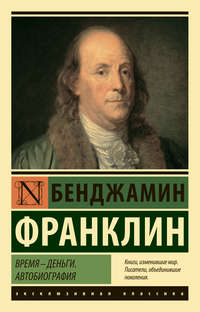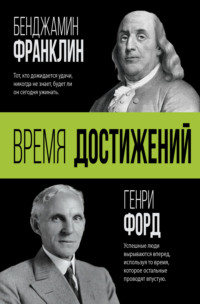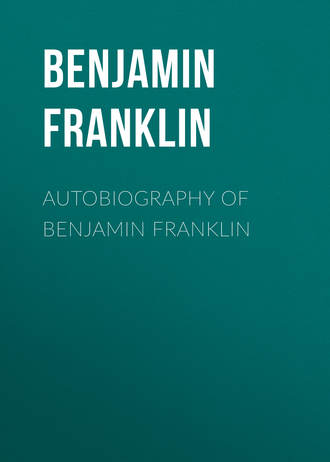 полная версия
полная версияAutobiography of Benjamin Franklin
When we came into the Channel, the captain kept his word with me, and gave me an opportunity of examining the bag for the governor's letters. I found none upon which my name was put as under my care. I picked out six or seven, that, by the handwriting, I thought might be the promised letters, especially as one of them was directed to Basket, the king's printer, and another to some stationer. We arriv'd in London the 24th of December, 1724. I waited upon the stationer, who came first in my way, delivering the letter as from Governor Keith. "I don't know such a person," says he; but, opening the letter, "O! this is from Riddlesden. I have lately found him to be a compleat rascal, and I will have nothing to do with him, nor receive any letters from him." So, putting the letter into my hand, he turn'd on his heel and left me to serve some customer. I was surprised to find these were not the governor's letters; and, after recollecting and comparing circumstances, I began to doubt his sincerity. I found my friend Denham, and opened the whole affair to him. He let me into Keith's character; told me there was not the least probability that he had written any letters for me; that no one, who knew him, had the smallest dependence on him; and he laught at the notion of the governor's giving me a letter of credit, having, as he said, no credit to give. On my expressing some concern about what I should do, he advised me to endeavour getting some employment in the way of my business. "Among the printers here," said he, "you will improve yourself, and when you return to America, you will set up to greater advantage."
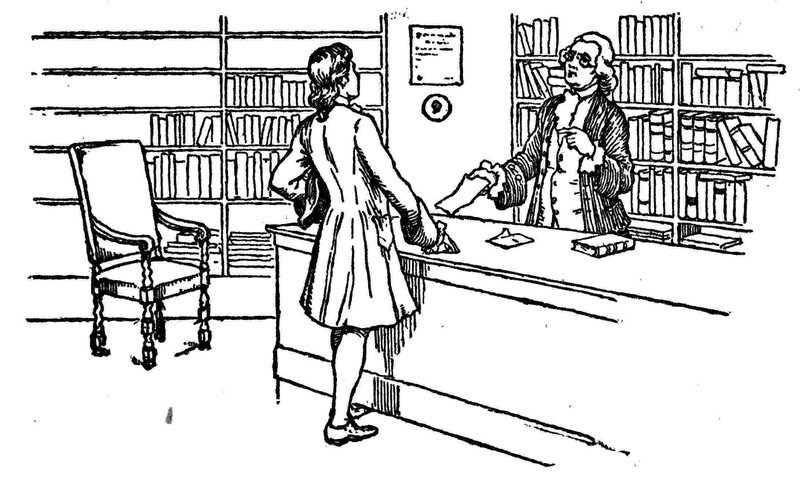
We both of us happen'd to know, as well as the stationer, that Riddlesden, the attorney, was a very knave. He had half ruin'd Miss Read's father by persuading him to be bound for him. By this letter it appear'd there was a secret scheme on foot to the prejudice of Hamilton (suppos'd to be then coming over with us); and that Keith was concerned in it with Riddlesden. Denham, who was a friend of Hamilton's, thought he ought to be acquainted with it; so, when he arriv'd in England, which was soon after, partly from resentment and ill-will to Keith and Riddlesden, and partly from good-will to him, I waited on him, and gave him the letter. He thank'd me cordially, the information being of importance to him; and from that time he became my friend, greatly to my advantage afterwards on many occasions.
But what shall we think of a governor's playing such pitiful tricks, and imposing so grossly on a poor ignorant boy! It was a habit he had acquired. He wish'd to please everybody; and, having little to give, he gave expectations. He was otherwise an ingenious, sensible man, a pretty good writer, and a good governor for the people, tho' not for his constituents, the proprietaries, whose instructions he sometimes disregarded. Several of our best laws were of his planning and passed during his administration.
Ralph and I were inseparable companions. We took lodgings together in Little Britain36 at three shillings and sixpence a week—as much as we could then afford. He found some relations, but they were poor, and unable to assist him. He now let me know his intentions of remaining in London, and that he never meant to return to Philadelphia. He had brought no money with him, the whole he could muster having been expended in paying his passage. I had fifteen pistoles;37 so he borrowed occasionally of me to subsist, while he was looking out for business. He first endeavoured to get into the play-house, believing himself qualify'd for an actor; but Wilkes,38 to whom he apply'd, advis'd him candidly not to think of that employment, as it was impossible he should succeed in it. Then he propos'd to Roberts, a publisher in Paternoster Row,39 to write for him a weekly paper like the Spectator, on certain conditions, which Roberts did not approve. Then he endeavoured to get employment as a hackney writer, to copy for the stationers and lawyers about the Temple,40 but could find no vacancy.
I immediately got into work at Palmer's, then a famous printing-house in Bartholomew Close, and here I continu'd near a year. I was pretty diligent, but spent with Ralph a good deal of my earnings in going to plays and other places of amusement. We had together consumed all my pistoles, and now just rubbed on from hand to mouth. He seem'd quite to forget his wife and child, and I, by degrees, my engagements with Miss Read, to whom I never wrote more than one letter, and that was to let her know I was not likely soon to return. This was another of the great errata of my life, which I should wish to correct if I were to live it over again. In fact, by our expenses, I was constantly kept unable to pay my passage.
At Palmer's I was employed in composing for the second edition of Wollaston's "Religion of Nature." Some of his reasonings not appearing to me well founded, I wrote a little metaphysical piece in which I made remarks on them. It was entitled "A Dissertation on Liberty and Necessity, Pleasure and Pain." I inscribed it to my friend Ralph; I printed a small number. It occasion'd my being more consider'd by Mr. Palmer as a young man of some ingenuity, tho' he seriously expostulated with me upon the principles of my pamphlet, which to him appear'd abominable. My printing this pamphlet was another erratum.
While I lodg'd in Little Britain, I made an acquaintance with one Wilcox, a bookseller, whose shop was at the next door. He had an immense collection of second-hand books. Circulating libraries were not then in use; but we agreed that, on certain reasonable terms, which I have now forgotten, I might take, read, and return any of his books. This I esteem'd a great advantage, and I made as much use of it as I could.
My pamphlet by some means falling into the hands of one Lyons, a surgeon, author of a book entitled "The Infallibility of Human Judgment," it occasioned an acquaintance between us. He took great notice of me, called on me often to converse on those subjects, carried me to the Horns, a pale alehouse in– Lane, Cheapside, and introduced me to Dr. Mandeville, author of the "Fable of the Bees," who had a club there, of which he was the soul, being a most facetious, entertaining companion. Lyons, too, introduced me to Dr. Pemberton, at Batson's Coffee-house, who promis'd to give me an opportunity, sometime or other, of seeing Sir Isaac Newton, of which I was extreamly desirous; but this never happened.
I had brought over a few curiosities, among which the principal was a purse made of the asbestos, which purifies by fire. Sir Hans Sloane heard of it, came to see me, and invited me to his house in Bloomsbury Square, where he show'd me all his curiosities, and persuaded me to let him add that to the number, for which he paid me handsomely.
In our house there lodg'd a young woman, a milliner, who, I think, had a shop in the Cloisters. She had been genteelly bred, was sensible and lively, and of most pleasing conversation. Ralph read plays to her in the evenings, they grew intimate, she took another lodging, and he followed her. They liv'd together some time; but, he being still out of business, and her income not sufficient to maintain them with her child, he took a resolution of going from London, to try for a country school, which he thought himself well qualified to undertake, as he wrote an excellent hand, and was a master of arithmetic and accounts. This, however, he deemed a business below him, and confident of future better fortune, when he should be unwilling to have it known that he once was so meanly employed, he changed his name, and did me the honour to assume mine; for I soon after had a letter from him, acquainting me that he was settled in a small village (in Berkshire, I think it was, where he taught reading and writing to ten or a dozen boys, at sixpence each per week), recommending Mrs. T– to my care, and desiring me to write to him, directing for Mr. Franklin, schoolmaster, at such a place.
He continued to write frequently, sending me large specimens of an epic poem which he was then composing, and desiring my remarks and corrections. These I gave him from time to time, but endeavour'd rather to discourage his proceeding. One of Young's Satires41 was then just published. I copy'd and sent him a great part of it, which set in a strong light the folly of pursuing the Muses with any hope of advancement by them. All was in vain; sheets of the poem continued to come by every post. In the meantime, Mrs. T–, having on his account lost her friends and business, was often in distresses, and us'd to send for me and borrow what I could spare to help her out of them. I grew fond of her company, and, being at that time under no religious restraint, and presuming upon my importance to her, I attempted familiarities (another erratum) which she repuls'd with a proper resentment, and acquainted him with my behaviour. This made a breach between us; and, when he returned again to London, he let me know he thought I had cancell'd all the obligations he had been under to me. So I found I was never to expect his repaying me what I lent to him or advanc'd for him. This, however, was not then of much consequence, as he was totally unable; and in the loss of his friendship I found myself relieved from a burthen. I now began to think of getting a little money beforehand, and, expecting better work, I left Palmer's to work at Watts's, near Lincoln's Inn Fields, a still greater printing-house.42 Here I continued all the rest of my stay in London.
At my first admission into this printing-house I took to working at press, imagining I felt a want of the bodily exercise I had been us'd to in America, where presswork is mix'd with composing. I drank only water; the other workmen, near fifty in number, were great guzzlers of beer. On occasion, I carried up and down stairs a large form of types in each hand, when others carried but one in both hands. They wondered to see, from this and several instances, that the Water-American, as they called me, was stronger than themselves, who drank strong beer! We had an alehouse boy who attended always in the house to supply the workmen. My companion at the press drank every day a pint before breakfast, a pint at breakfast with his bread and cheese, a pint between breakfast and dinner, a pint at dinner, a pint in the afternoon about six o'clock, and another when he had done his day's work. I thought it a detestable custom; but it was necessary, he suppos'd, to drink strong beer, that he might be strong to labour. I endeavoured to convince him that the bodily strength afforded by beer could only be in proportion to the grain or flour of the barley dissolved in the water of which it was made; that there was more flour in a pennyworth of bread; and therefore, if he would eat that with a pint of water, it would give him more strength than a quart of beer. He drank on, however, and had four or five shillings to pay out of his wages every Saturday night for that muddling liquor; an expense I was free from. And thus these poor devils keep themselves always under.
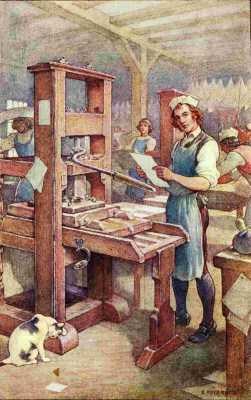
"I took to working at press"
Watts, after some weeks, desiring to have me in the composing-room,43 I left the pressmen; a new bien venu or sum for drink, being five shillings, was demanded of me by the compositors. I thought it an imposition, as I had paid below; the master thought so too, and forbade my paying it. I stood out two or three weeks, was accordingly considered as an excommunicate, and had so many little pieces of private mischief done me, by mixing my sorts, transposing my pages, breaking my matter, etc., etc., if I were ever so little out of the room, and all ascribed to the chappel ghost, which they said ever haunted those not regularly admitted, that, notwithstanding the master's protection, I found myself oblig'd to comply and pay the money, convinc'd of the folly of being on ill terms with those one is to live with continually.
I was now on a fair footing with them, and soon acquir'd considerable influence. I propos'd some reasonable alterations in their chappel laws,44 and carried them against all opposition. From my example, a great part of them left their muddling breakfast of beer, and bread, and cheese, finding they could with me be supply'd from a neighbouring house with a large porringer of hot water-gruel, sprinkled with pepper, crumb'd with bread, and a bit of butter in it, for the price of a pint of beer, viz., three half-pence. This was a more comfortable as well as cheaper breakfast, and keep their heads clearer. Those who continued sotting with beer all day, were often, by not paying, out of credit at the alehouse, and us'd to make interest with me to get beer; their light, as they phrased it, being out. I watch'd the pay-table on Saturday night, and collected what I stood engag'd for them, having to pay sometimes near thirty shillings a week on their accounts. This, and my being esteem'd a pretty good riggite, that is, a jocular verbal satirist, supported my consequence in the society. My constant attendance (I never making a St. Monday)45 recommended me to the master; and my uncommon quickness at composing occasioned my being put upon all work of dispatch, which was generally better paid. So I went on now very agreeably.
My lodging in Little Britain being too remote, I found another in Duke-street, opposite to the Romish Chapel. It was two pair of stairs backwards, at an Italian warehouse. A widow lady kept the house; she had a daughter, and a maid servant, and a journeyman who attended the warehouse, but lodg'd abroad. After sending to inquire my character at the house where I last lodg'd she agreed to take me in at the same rate, 3s. 6d. per week; cheaper, as she said, from the protection she expected in having a man lodge in the house. She was a widow, an elderly woman; had been bred a Protestant, being a clergyman's daughter, but was converted to the Catholic religion by her husband, whose memory she much revered; had lived much among people of distinction, and knew a thousand anecdotes of them as far back as the times of Charles the Second. She was lame in her knees with the gout, and, therefore, seldom stirred out of her room, so sometimes wanted company; and hers was so highly amusing to me, that I was sure to spend an evening with her whenever she desired it. Our supper was only half an anchovy each, on a very little strip of bread and butter, and half a pint of ale between us; but the entertainment was in her conversation. My always keeping good hours, and giving little trouble in the family, made her unwilling to part with me, so that, when I talk'd of a lodging I had heard of, nearer my business, for two shillings a week, which, intent as I now was on saving money, made some difference, she bid me not think of it, for she would abate me two shillings a week for the future; so I remained with her at one shilling and sixpence as long as I staid in London.
In a garret of her house there lived a maiden lady of seventy, in the most retired manner, of whom my landlady gave me this account: that she was a Roman Catholic, had been sent abroad when young, and lodg'd in a nunnery with an intent of becoming a nun; but, the country not agreeing with her, she returned to England, where, there being no nunnery, she had vow'd to lead the life of a nun, as near as might be done in those circumstances. Accordingly, she had given all her estate to charitable uses, reserving only twelve pounds a year to live on, and out of this sum she still gave a great deal in charity, living herself on water-gruel only, and using no fire but to boil it. She had lived many years in that garret, being permitted to remain there gratis by successive Catholic tenants of the house below, as they deemed it a blessing to have her there. A priest visited her to confess her every day. "I have ask'd her," says my landlady, "how she, as she liv'd, could possibly find so much employment for a confessor?" "Oh," said she, "it is impossible to avoid vain thoughts." I was permitted once to visit her. She was cheerful and polite, and convers'd pleasantly. The room was clean, but had no other furniture than a matras, a table with a crucifix and book, a stool which she gave me to sit on, and a picture over the chimney of Saint Veronica displaying her handkerchief, with the miraculous figure of Christ's bleeding face on it,46 which she explained to me with great seriousness. She look'd pale, but was never sick; and I give it as another instance on how small an income, life and health may be supported.
At Watts's printing-house I contracted an acquaintance with an ingenious young man, one Wygate, who, having wealthy relations, had been better educated than most printers; was a tolerable Latinist, spoke French, and lov'd reading. I taught him and a friend of his to swim at twice going into the river, and they soon became good swimmers. They introduc'd me to some gentlemen from the country, who went to Chelsea by water to see the College and Don Saltero's curiosities.47 In our return, at the request of the company, whose curiosity Wygate had excited, I stripped and leaped into the river, and swam from near Chelsea to Blackfriar's,48 performing on the way many feats of activity, both upon and under water, that surpris'd and pleas'd those to whom they were novelties.
I had from a child been ever delighted with this exercise, had studied and practis'd all Thevenot's motions and positions, added some of my own, aiming at the graceful and easy as well as the useful. All these I took this occasion of exhibiting to the company, and was much flatter'd by their admiration; and Wygate, who was desirous of becoming a master, grew more and more attach'd to me on that account, as well as from the similarity of our studies. He at length proposed to me traveling all over Europe together, supporting ourselves everywhere by working at our business. I was once inclined to it; but, mentioning it to my good friend Mr. Denham, with whom I often spent an hour when I had leisure, he dissuaded me from it, advising me to think only of returning to Pennsylvania, which he was now about to do.
I must record one trait of this good man's character. He had formerly been in business at Bristol, but failed in debt to a number of people, compounded and went to America. There, by a close application to business as a merchant, he acquired a plentiful fortune in a few years. Returning to England in the ship with me, he invited his old creditors to an entertainment, at which he thank'd them for the easy composition they had favoured him with, and, when they expected nothing but the treat, every man at the first remove found under his plate an order on a banker for the full amount of the unpaid remainder with interest.
He now told me he was about to return to Philadelphia, and should carry over a great quantity of goods in order to open a store there. He propos'd to take me over as his clerk, to keep his books, in which he would instruct me, copy his letters, and attend the store. He added, that, as soon as I should be acquainted with mercantile business, he would promote me by sending me with a cargo of flour and bread, etc., to the West Indies, and procure me commissions from others which would be profitable; and, if I manag'd well, would establish me handsomely. The thing pleas'd me; for I was grown tired of London, remembered with pleasure the happy months I had spent in Pennsylvania, and wish'd again to see it; therefore I immediately agreed on the terms of fifty pounds a year,49 Pennsylvania money; less, indeed, than my present gettings as a compositor, but affording a better prospect.
I now took leave of printing, as I thought, forever, and was daily employed in my new business, going about with Mr. Denham among the tradesmen to purchase various articles, and seeing them pack'd up, doing errands, calling upon workmen to dispatch, etc.; and, when all was on board, I had a few days' leisure. On one of these days, I was, to my surprise, sent for by a great man I knew only by name, a Sir William Wyndham, and I waited upon him. He had heard by some means or other of my swimming from Chelsea to Blackfriars, and of my teaching Wygate and another young man to swim in a few hours. He had two sons, about to set out on their travels; he wish'd to have them first taught swimming, and proposed to gratify me handsomely if I would teach them. They were not yet come to town, and my stay was uncertain, so I could not undertake it; but, from this incident, I thought it likely that, if I were to remain in England and open a swimming-school, I might get a good deal of money; and it struck me so strongly, that, had the overture been sooner made me, probably I should not so soon have returned to America. After many years, you and I had something of more importance to do with one of these sons of Sir William Wyndham, become Earl of Egremont, which I shall mention in its place.
Thus I spent about eighteen months in London; most part of the time I work'd hard at my business, and spent but little upon myself except in seeing plays and in books. My friend Ralph had kept me poor; he owed me about twenty-seven pounds, which I was now never likely to receive; a great sum out of my small earnings! I lov'd him, notwithstanding, for he had many amiable qualities. I had by no means improv'd my fortune; but I had picked up some very ingenious acquaintance, whose conversation was of great advantage to me; and I had read considerably.
VII
BEGINNING BUSINESS IN PHILADELPHIA
WE sail'd from Gravesend on the 23rd of July, 1726. For the incidents of the voyage, I refer you to my Journal, where you will find them all minutely related. Perhaps the most important part of that journal is the plan50 to be found in it, which I formed at sea, for regulating my future conduct in life. It is the more remarkable, as being formed when I was so young, and yet being pretty faithfully adhered to quite thro' to old age.
We landed in Philadelphia on the 11th of October, where I found sundry alterations. Keith was no longer governor, being superseded by Major Gordon. I met him walking the streets as a common citizen. He seem'd a little asham'd at seeing me, but pass'd without saying anything. I should have been as much asham'd at seeing Miss Read, had not her friends, despairing with reason of my return after the receipt of my letter, persuaded her to marry another, one Rogers, a potter, which was done in my absence. With him, however, she was never happy, and soon parted from him, refusing to cohabit with him or bear his name, it being now said that he had another wife. He was a worthless fellow, tho' an excellent workman, which was the temptation to her friends. He got into debt, ran away in 1727 or 1728, went to the West Indies, and died there. Keimer had got a better house, a shop well supply'd with stationery, plenty of new types, a number of hands, tho' none good, and seem'd to have a great deal of business.
Mr. Denham took a store in Water-street, where we open'd our goods; I attended the business diligently, studied accounts, and grew, in a little time, expert at selling. We lodg'd and boarded together; he counsell'd me as a father, having a sincere regard for me. I respected and loved him, and we might have gone on together very happy; but, in the beginning of February, 1726/7, when I had just pass'd my twenty-first year, we both were taken ill. My distemper was a pleurisy, which very nearly carried me off. I suffered a good deal, gave up the point in my own mind, and was rather disappointed when I found myself recovering, regretting, in some degree, that I must now, some time or other, have all that disagreeable work to do over again. I forget what his distemper was; it held him a long time, and at length carried him off. He left me a small legacy in a nuncupative will, as a token of his kindness for me, and he left me once more to the wide world; for the store was taken into the care of his executors, and my employment under him ended.
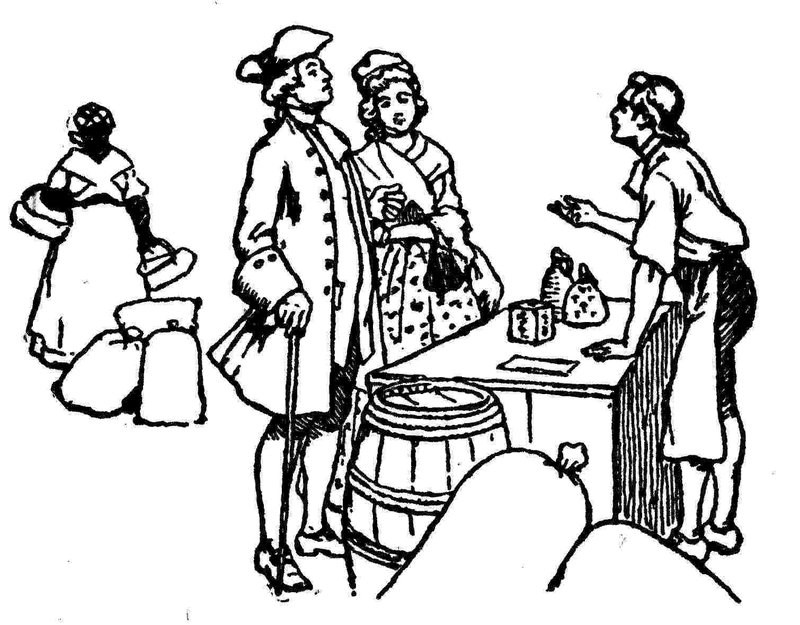
My brother-in-law, Holmes, being now at Philadelphia, advised my return to my business; and Keimer tempted me, with an offer of large wages by the year, to come and take the management of his printing-house, that he might better attend his stationer's shop. I had heard a bad character of him in London from his wife and her friends, and was not fond of having any more to do with him. I tri'd for farther employment as a merchant's clerk; but, not readily meeting with any, I clos'd again with Keimer. I found in his house these hands: Hugh Meredith, a Welsh Pennsylvanian, thirty years of age, bred to country work; honest, sensible, had a great deal of solid observation, was something of a reader, but given to drink. Stephen Potts, a young countryman of full age, bred to the same, of uncommon natural parts, and great wit and humor, but a little idle. These he had agreed with at extream low wages per week to be rais'd a shilling every three months, as they would deserve by improving in their business; and the expectation of these high wages, to come on hereafter, was what he had drawn them in with. Meredith was to work at press, Potts at book-binding, which he, by agreement, was to teach them, though he knew neither one nor t'other. John–, a wild Irishman, brought up to no business, whose service, for four years, Keimer had purchased from the captain of a ship; he, too, was to be made a pressman. George Webb, an Oxford scholar, whose time for four years he had likewise bought, intending him for a compositor, of whom more presently; and David Harry, a country boy, whom he had taken apprentice.


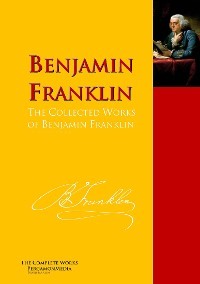
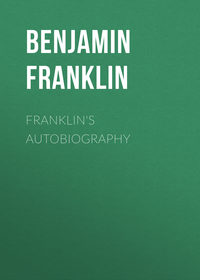
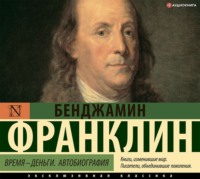
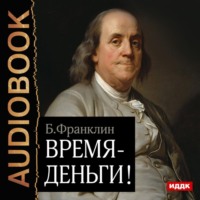
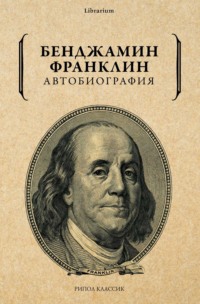
![Memoirs of Benjamin Franklin; Written by Himself. [Vol. 2 of 2]](/covers_200/24858395.jpg)
